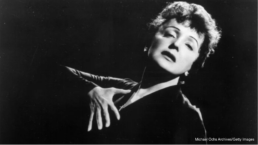These life stories may contain descriptions of childhood trauma and abuse, as well as images, voices and names of people now deceased. If you need help, you can find contact details for some relevant support services on our support page.
Popular French singer and songwriter, Edith Piaf (1915-1963), was in kinship care for her first fourteen years.
Edith Piaf was born Edith Giovanna Gassion in a poor area of Paris in the twentieth arrondissement. She was immediately abandoned by her mother, street performer Annetta Maillard, who left the tiny baby with her mother. Edith’s father, Louis Gassion, was not impressed with the grandmother’s quarters and took his daughter to live with her paternal grandmother in Normandy, France. Her grandmother ran a bordello and sex workers helped care for the child.
At age fourteen, (or perhaps younger), Edith became part of her father’s troupe of itinerant street performers and acrobats.
Later she sang on her own in the streets, belting out songs about abandoned prostitutes, lost loves, unhappy soldiers–the “chansons realistes” that were popular then, especially among women (Carter).
Night club owner, Louis Leplee, presented her as a talented street kid when she was nineteen. Although she was with Leplee for only twelve months until his death, she became a “huge success” and followed her night club appearances with radio, records and song-writing. She then asked lyricist Raymond Asso to teach her how “to speak, how to act, how to be.”
“I was saved… It took him three years to cure me. Three years of patient affection to teach me that there was another world beyond that of prostitutes and pimps. Three years to cure me … of my chaotic childhood” (Carter).
By the Second World War, Edith Piaf “had become one of the top entertainers in Paris.” When the War ended, she toured internationally, endearing herself to many and becoming a household name.
Her records sold forty million copies in her lifetime, and she composed many of her own lyrics, including those to “Hymne a l’Amour” and “La Vie en Rose,” which was inducted into the Grammy Hall of Fame in 1998. “She is an inimitable genius,” Jean Cocteau wrote. “There has never been an Edith Piaf before, and there will never be another” (Thurman).
References:
Carter, Betty Smartt. “Daughter of Joy.” Books & Culture, vol.17, no.3 (2011):25f
Cavendish, Richard. “Death of Edith Piaf.” History Today, vol. 63, no.10 (2013):9. https://www.historytoday.com/archive/months-past/death-edith-piaf
Thurman Judith. “French Blues.” The New Yorker, vol. 83, no.17 (2007): 49. https://www.newyorker.com/magazine/2007/06/25/french-blues
Image available here.
